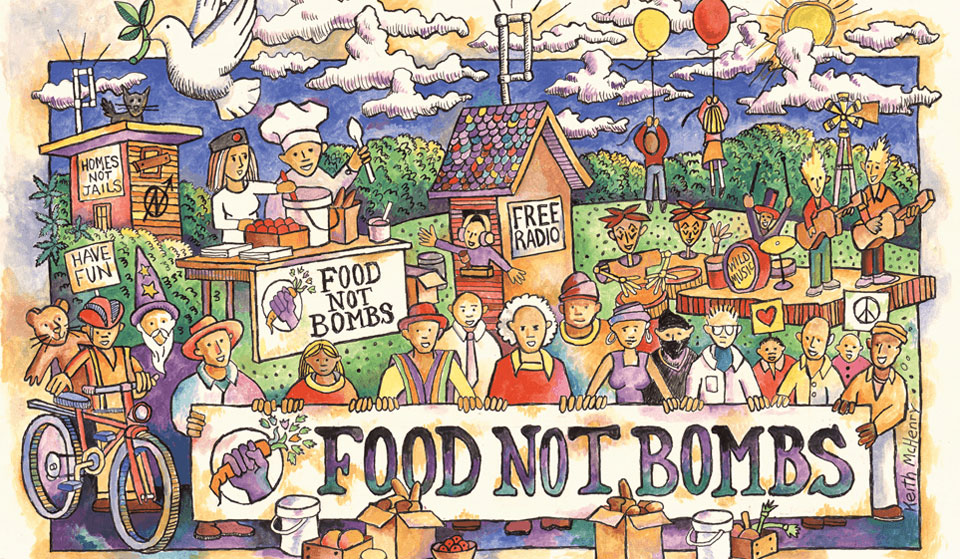
Twenty-five years ago, on September 2, 1993, 15 Food Not Bombs volunteers were arrested outside San Francisco City Hall. They were there to protest Mayor Frank Jordan’s Matrix Program aimed at the homeless, and charged with felony conspiracy to commit a misdemeanor.
Food Not Bombs (FNB) traces its origins back to 1980, when Brian Feigenbaum, later a co-founder of the group, was arrested at the May 24th Direct Action to Stop Seabrook Nuclear Station in New Hampshire, inspiring bake sales to raise money for his defense and the Bake Sales to Buy a B-1 Bomber.
Almost a year later, on March 26, 1981, FNB shared food at its first action, protesting the interlocking directors at the Bank of Boston and the local nuclear industry. The activists dressed as hobos and set up a soup kitchen outside the stockholders meeting at South Station with the message that their policies could cause another Great Depression. Over 50 people came to eat.
Scores of FNB groups have emerged throughout the United States and around the world. Each time their members get arrested it seems to spawn a new collective somewhere.
Why do volunteers handing out free food to the hungry and homeless get arrested?
There have been many attempts to shut down local Food Not Bombs groups by claiming they need a permit to share free meals and that volunteers need to cook in a licensed facility. San Francisco authorities claimed they were making unapproved political statements. Then the city started claiming that the group needed a permit from the parks department. When that didn’t work they said FNB needed a health permit, even though California state law clearly stated that no one was required to have this permit unless they were selling or making money from distributing the food. Still, police in that city made over 1,000 arrests.
Food permit laws are designed to regulate the distribution of meals where there is an economic incentive to cut corners in the preparation or serving of meals. FNB is an all-volunteer project sharing free vegetarian meals and literature in protest against war and poverty. Efforts to stop FNB are based on political considerations and have nothing to do with food safety.
The real reason authorities arrest FNB volunteers is that in the U.S., and in other wealthy countries, they are bringing attention to the embarrassing fact that so many fellow human beings have been left behind by capitalism as so much detritus of the system. In that sense, says Keith McHenry, co-author of Food Not Bombs: How to Feed the Hungry and Build Community, arresting FNB is above all, censorship.
According to McHenry, in San Francisco FNB has purchased “a million dollar liability insurance policy for the City every year. No one has ever been made sick from eating any of the over one million meals served on the streets of North America.” FNB even has a fire permit for serving hot meals outdoors.
“It is estimated,” says McHenry, “that the taxpayers of San Francisco have spent over ten million dollars to stop Food Not Bombs from feeding the hungry…. As San Francisco Police Commander Dennis Martel clearly stated at his September 24, 1993, press conference, ‘They’re obviously not trying to serve food, they are just making an anarchist statement and we are not going to allow it.’”
Somewhere in the world, FNB is feeding hundreds of people every day, but “they also stand up for the civil and human rights of the poor, homeless, hungry and, ultimately, all of us,” McHenry concludes.
The Food Not Bombs website can be accessed here.












Comments